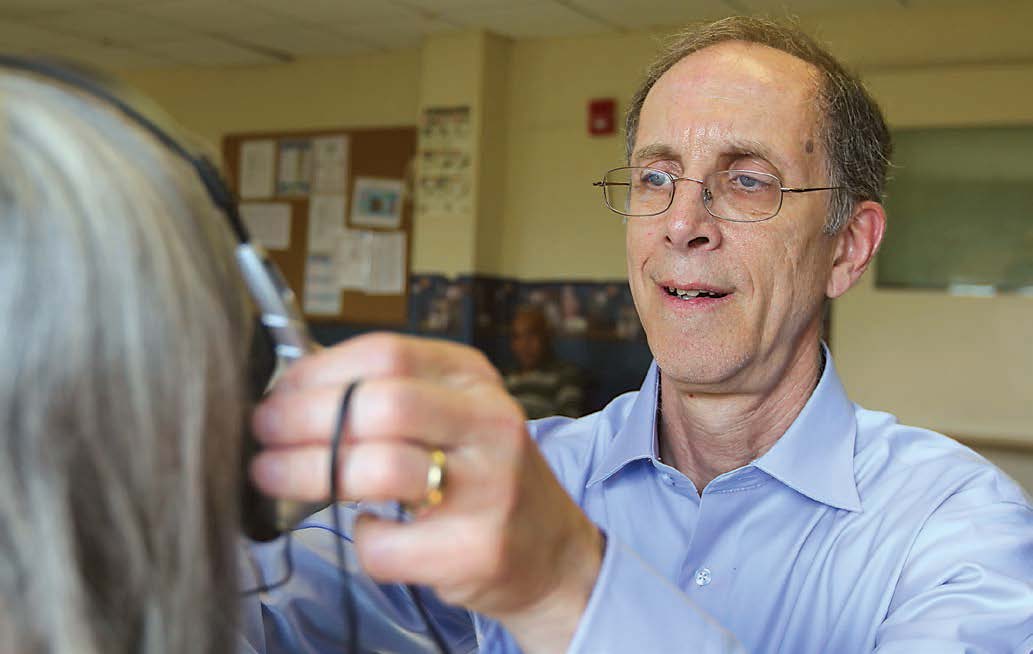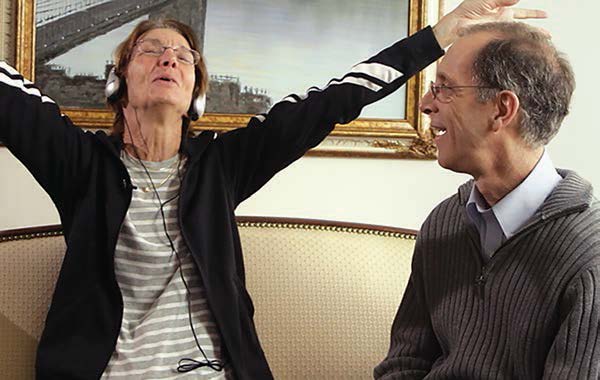
By Sam Gaines
Music has the ability to reach people living with Alzheimer’s disease and other dementias in positive, powerful ways.
Anyone who loves music can attest to its power to transform a mood, to bring back cherished memories, and so much more. Researchers and music therapists can attest to its power to help people living with Alzheimer’s disease in ways that are sometimes surprising and almost always inspiring.
A recent film, Alive Inside, shows Alzheimer’s patients who are in some cases almost completely withdrawn from their immediate environment suddenly “come to life” when given a portable music player (in this case, an iPod) and headphones. Hearing some of their favorite music, they begin to smile, sometimes even singing along and, if possible, dancing. (See sidebar for more information.)
Where does music get this power? From what happens in the brain when you listen to music you enjoy.
Music in the Brain
While the effects of music cannot overcome the toll of Alzheimer’s disease and other dementias, it can temporarily “lift” a patient out of the isolation and frustration of their condition, say experts. One study—one of many—proved this point. Researchers at George Mason University followed 45 people living with Alzheimer’s or other dementias who sang as part of their routine. They used a standard cognitive diagnostic test to track how they did, relative to their non-singing peers.
Over the four-month period of the study, singers showed a heightened mental acuity compared to their counterparts who didn’t sing.
Dr. Concetta Tomaino, Co-founder and Executive Director of the Institute for Music and Neurologic Function, says there is a wealth of research showing music’s therapeutic value for people living with Alzheimer’s and other dementias. “In the early stages of Alzheimer’s disease, people have problems with attention and short-term memory. Active musicmaking can increase time on task and improve attention,” she says. “In later stages, it can help with recognition memory and allow for meaningful interactions with loved ones that may be otherwise lost due to lack of verbal ability. Sharing familiar music of personal importance can enable reminiscences and open opportunities for connections.”
So what’s happening inside the brain when music infuses it? It’s still largely unknown, says Dr. Marc Flajolet, Research Assistant Professor at the Fisher Center for Alzheimer’s Research. “While many theories exist, it is still quite unclear how the brain integrates music,” Dr. Flajolet says. “Because so many brain regions are involved, it is hard to imagine that specific pathways exist. Rather, complex neuronal networks might be activated, and possibly other networks (e.g., involved in anxiety, stress response) might be turned off by music.”
One thing’s for sure: Music does have a powerful effect on people, including people living with Alzheimer’s disease. “One thing that we know from various medical studies using scanning techniques performed on individuals is that there is not one single brain region specific for music, but rather the entire brain seems to be affected and responding to music,” says Dr. Flajolet. “That might be part of the reason why music might be so powerful in helping the Alzheimer’s patient because instead of stimulating just one brain region, music might wake up most brain regions.”
Putting Music to Work Music as therapy is not a new idea, says Dr. Tomaino. It’s been studied and is now implemented at clinics and facilities nationwide. Its effects can be dramatic, she adds. “Active music making can increase time on task and improve attention,” she notes. “Melodic phrases can be paired with information to help with memory recall.”
Those improvements can even be seen later in Alzheimer’s progression, too. “In later stages, it can help with recognition memory and allow for meaningful interactions with loved ones,” says Dr. Tomaino. “Sharing familiar music of personal importance can enable reminiscences and open opportunities for connections that may be otherwise lost due to lack of verbal ability.”

Dr. Tomaino distinguishes between music therapy and music as a therapeutic tool. Music therapy, she says, is provided by board-certified music therapists. “[They] are trained in assessing how music and the components of music can be used to aid in multiple areas including cognition, balance and gait, communication skills, pain management, agitation and behavioral issues, social interactions and overall quality of life,” she says. “Music therapists provide advisement to clinical staff and family members on ways they can use music every day to benefit someone with dementia or AD.”
Alive Inside: Music and Memory
In the powerful film, Alive Inside, Music & Memory founder Dan Cohen distributes iPods and headphones to Alzheimer’s patients in elder care facilities. The iPods have been loaded with music beloved by each individual. The Music & Memory program has distributed thousands of these to patients all over the U.S., touching lives all over the country. You can learn more about this program at www.musicandmemory.org.
You can view Alive Inside via Netflix (DVD only), Amazon Prime, or YouTube Movies. Please note that these are paid services. You can also purchase the movie wherever DVDs are sold.










